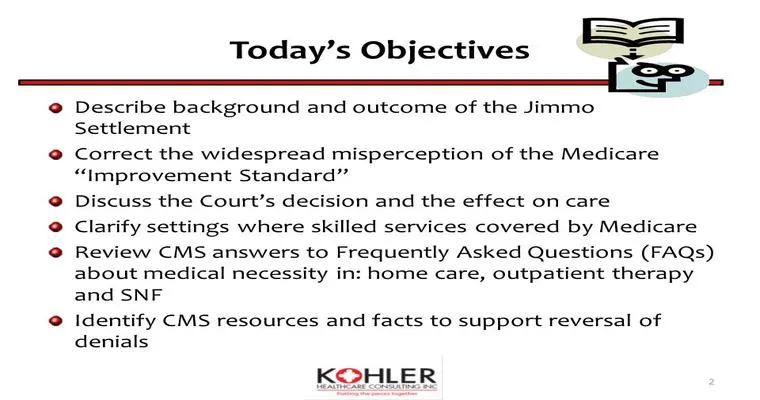Navigating the complexities of skilled nursing facilities (SNFs) can be challenging, especially when it comes to understanding the "Jimmo Settlement agreement" and its implications for patient care. The Jimmo Settlement specifically addresses the need for SNFs to provide necessary therapy services aimed at preventing decline, rather than solely focusing on improvement. If you are seeking to ensure that a SNF therapy department acknowledges this settlement and its guidelines, there are several steps you can take.
First and foremost, it is crucial to familiarize yourself with the "Jimmo Settlement agreement" and its key provisions. The settlement establishes that patients are entitled to skilled therapy services to maintain their current condition or prevent further decline, regardless of whether the patient is expected to achieve significant improvement. This understanding is vital for advocating for appropriate care.
Next, communicate clearly with the therapy department. Prepare to articulate your understanding of the Jimmo Settlement and how it applies to the care of your loved one or patient. You can present documentation that outlines the settlement's key points and how they relate to the specific circumstances of the individual receiving care. This can include examples of how therapy services can help maintain function and quality of life, reinforcing the importance of acknowledgment from the therapy team.
In addition to direct communication, consider involving other stakeholders in the conversation. Engaging with the individual’s primary care physician, case manager, or social worker can help reinforce your message. These professionals can advocate on behalf of the patient, highlighting the necessity of therapy services in line with the "Jimmo Settlement agreement".
Another effective approach is to request a care plan meeting. During this meeting, you can discuss the patient’s therapy needs and how they align with the provisions of the Jimmo Settlement. Ensure that the meeting includes key members of the therapy team, so they are directly involved in the conversation about the need for ongoing care to prevent decline.
If you find that the therapy department remains unresponsive or dismissive of the settlement, it may be necessary to escalate the issue. Consider contacting the facility's administration or filing a formal complaint with the appropriate regulatory body. Documentation of all communications and care plans will be essential in these situations.
Lastly, consider reaching out to advocacy groups or legal resources that specialize in elder care and the Jimmo Settlement. These organizations can provide additional support, guidance, and resources to help ensure that your loved one receives the care they are entitled to under the settlement.
In conclusion, ensuring that a SNF therapy department acknowledges the "Jimmo Settlement agreement" requires a proactive approach. By educating yourself, effectively communicating the importance of therapy services, involving key stakeholders, and advocating as necessary, you can help ensure that your loved one receives the quality care they deserve.





